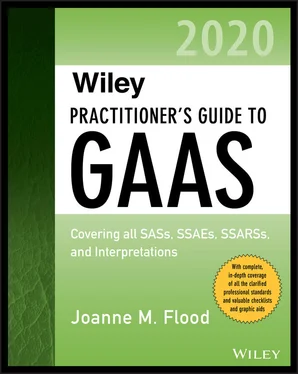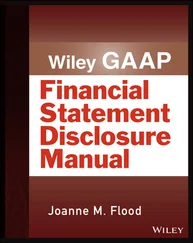AU-C 210 Illustration
This section states the requirements and provides application guidance on the auditor’s responsibilities when agreeing upon terms of engagement with management and those charged with governance. It also establishes the important preconditions for an audit, for which management is responsible. AU-C 220, Quality Control for an Engagement Conducted in Accordance with Generally Accepted Auditing Standards , addresses those aspects of engagement acceptance that the auditor can control and the auditor’s responsibilities regarding ethical requirements concerning acceptance of an engagement. (AU-C 210.01 and .A1)
Source: AU-C 210.04.For definitions related to this standard, see Appendix A, “Definitions of Terms”: Preconditions for an audit, Recurring Audit.
OBJECTIVES OF AU-C SECTION 210
AU-C Section 210.03 states that:
… the objective of the auditor is to accept an audit engagement for a new or existing audit client only when the basis upon which it is to be performed has been agreed upon through
1 establishing whether the preconditions for an audit are present and
2 confirming that a common understanding of the terms of the audit engagement exists between the auditor and management and, when appropriate, those charged with governance.
FUNDAMENTAL REQUIREMENTS
Engagement Acceptance
Preconditions
Unless required to do so by law or regulation, an auditor should discuss the situation with management and not accept an engagement when the preconditions (see Appendix A, “Definitions of Terms”) are not met. (AU-C 210.08) To assess whether those preconditions are met, the auditor should:
1 determine whether the financial reporting framework 1to be applied in the preparation of the financial statements is acceptable and
2 obtain the agreement of management that it acknowledges and understands its responsibilityfor the preparation and fair presentation of the financial statements in accordance with the applicable financial reporting framework;for the design, implementation, and maintenance of internal control relevant to the preparation and fair presentation of financial statements that are free from material misstatement, whether due to fraud or error; andto provide the auditor withaccess to all information of which management is aware that is relevant to the preparation and fair presentation of the financial statements, such as records, documentation, and other matters;additional information that the auditor may request from management for the purpose of the audit; andunrestricted access to persons within the entity from whom the auditor determines it necessary to obtain audit evidence.(AU-C 210.06)
In evaluating whether the financial reporting framework is acceptable, the auditor may want to consider:
The nature of the entity
The purpose and nature of the financial statements
Whether the framework is determined by law or regulator
(AU-C 210.A5)
If management limits the scope of the auditor’s work so that the auditor will have to disclaim an opinion, the auditor should not accept the engagement. The exception to this is when management is required by law or regulation to have an audit and the disclaimer of opinion is acceptable under law or regulation, for example, with audits of employee benefit plans. Then the auditor may accept the engagement, but is not required to do so. (AU-C 210.07 and .A19)
The auditor should establish an understanding in writing with management or those charged with governance 2about the services to be performed for each audit, review of a public company’s financial statements, or agreed-upon procedures for engagement. (AU-C 210.09) The understanding should include:
1 The engagement’s objectives and scope
2 Management’s responsibilities
3 Auditor’s responsibilities
4 The audit’s limitations, the inherent limitations of internal control, and the risk that some misstatements may not be detected
5 Financial reporting framework
6 Expected form and content of the report
(AU-C 210.10)
In addition, the auditor may want to:
Elaborate on the scope of the audit by referencing regulations, laws, GAAS, ethical codes, and pronouncements of professional bodies, as applicable.
Identify any communications in addition to the auditor’s report.
Discuss audit planning and performance, including composition of the audit team.
Remind management about the expectation of written representation, the agreement to make available draft financial statements on a timely basis, and the agreement for management to inform the auditor of subsequent events or facts discovered after the date of the financial statements that may affect the financial statements.
Detail fees and billing arrangements.
Request management to acknowledge receipt of the engagement letter and to agree to the terms by signing the letter.
(AU-C 210.A23)
The auditor may also choose to address arrangements concerning the involvement of other auditors, specialists, internal auditors and other entity staff, and predecessor auditors. Restrictions on auditor’s liability, when not prohibited; audit documentation to be provided to other parties; additional services; arrangements with component auditors; and any other agreements with the entity may be included in the engagement letter. (AU-C 210.A24)
If the auditor fails to establish an understanding, the auditor should decline the engagement. (AU-C 210.08) A sample engagement letter is included at the end of this chapter.
Initial Audits, Including Reaudits
Inquiry of the predecessor auditor is required because the predecessor may provide information that will assist the successor auditor in deciding whether to accept the engagement. The communication may be either written or oral. Both the predecessor and successor auditors should treat any information obtained from each other as confidential information. The successor auditor should request permission from the prospective client to make an inquiry of the predecessor prior to final acceptance of the engagement . However, the successor auditor may make a proposal for an audit engagement before having permission to inquire of the predecessor auditor.
The successor auditor should ask the prospective client to authorize the predecessor to respond fully to the successor auditor’s inquiries. If a prospective client refuses to permit the predecessor auditor to respond or limits the response, the successor auditor should inquire as to the reasons and consider the implications of that refusal in deciding whether to accept the engagement. (AU-C 210.11) The successor auditor should make specific and reasonable inquiries of the predecessor about the following four matters:
1 Information about management’s integrity
2 Disagreements with management about accounting principles, auditing procedures, or other significant matters
3 Communications to those charged with governance and responsibility regarding fraud, noncompliance with laws or regulations, and matters related to internal control
4 The predecessor auditor’s understanding of the reasons for the change of auditors
(AU-C 210.A31)
The predecessor auditor should respond promptly, fully, and factually. However, if the predecessor decides, due to unusual circumstances such as impending, threatened, or potential litigation; disciplinary proceedings; or other unusual circumstances, not to respond fully, he or she should indicate that the response is limited. Also, if more than one auditor is considering accepting the audit, the predecessor auditor does not have to respond to inquiries until an auditor has been selected by the entity and has accepted the engagement. Any information exchanged between the predecessor and successor auditors should be considered confidential. (AU-C 210.A28–A.30)
Читать дальше












